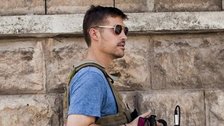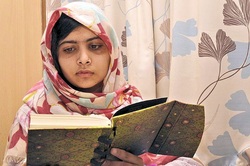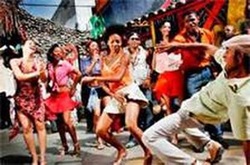They should have been here for Valentine

This Valentine Sunday will be heralded with music, being the food of love, in Shakespeare's words, but the music has temporarily stopped for the four members of the Viola Beach Band in London, their manager, their families and fans.
The music stopped on Saturday for the four members band, when the car they traveled with their manager dropped off a bridge into a canal in Sweden.
According to a BBC news report, the four members of the Viola Beach, Kris Leonard, River Reeves, Tomas Lowe and Jack Dakin and manager Craig Tarryh, died when the car in which they traveled crashed into a canal 82 ft below the ground.
The music stopped on Saturday for the four members band, when the car they traveled with their manager dropped off a bridge into a canal in Sweden.
According to a BBC news report, the four members of the Viola Beach, Kris Leonard, River Reeves, Tomas Lowe and Jack Dakin and manager Craig Tarryh, died when the car in which they traveled crashed into a canal 82 ft below the ground.
Sanders, Clinton and the MSNBC

There are battles currently being fought by various presidential contenders in the early battleground states of Iowa and New Hampshire. There is a clarity in the Republican Party's various poll results that Donald Trump has upstaged Ted Cruz in Iowa, but uncertainty reigns in the Democratic party's camp. It is uncertain who is leading who, between Hillary Clinton and Bernie Sanders. Some polls are showing that Hillary is in the lead, while others are showing that Sanders is in the lead.
Who is a journalist?

Sean Penn got what would have been a blockbuster interview with the kingpin of drug business, El-Chapo. In fact, the interview was considered a blockbuster before it stopped being a blockbuster, because of the traces of what a professional journalist would not have done in the writing. People have thus been asking whether or not Penn is a journalist or not. Many of the responses to another publication - another interview of a writer who specializes reporting the drug world - said unprintable things about Penn, his tagging himself as a journalist and the mystery behind his El-Chapo interview...
De Andrande's arts exhibition
By A Correspondent
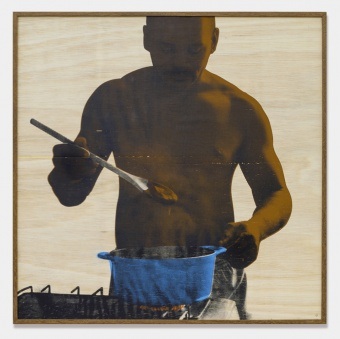
Jonathas de Andrade’s first one-person exhibition of sculptures and photographic works has opened at Alexander and Bonin in New York City. The works on exhibition date from 2013 to 2015 and address socio-economic issues in contemporary Brazil.
- In two multi-part installations, (Cartazes para o Museu do Homem do Nordeste and 40 nego bom é 1 real), both from 2013, Andrade questions the influential but controversial ideas of the Brazilian sociologist Gilberto Freyre, particularly as expressed in his 1933 publication Casa-Grande e Senzala (The Master and the Slave). In this text, Freyre suggests a lived experience of racial-democracy in Brazil, which he believed to be a result of miscegenation between Portuguese colonizers, Africans, and Native Brazilians.
Death as price for truth
By Abi Giwa
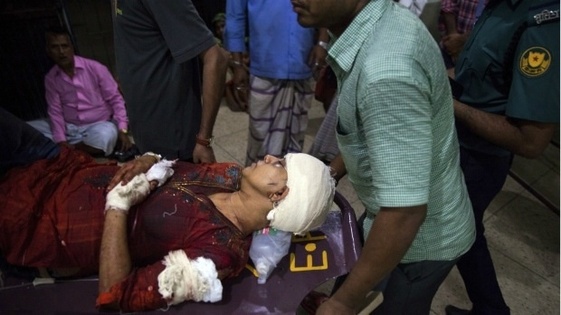
Boris Nemstov, a Russian politician and a known Vladimir Putin's critic is killed in Russia. Avijit Roy, a United States-Bangladesh blogger is killed in Bangladesh and his wife brutally attacked.
Major similarity between the politician and the blogger is that both are critics. And their murder arose from acts that people like approval than disapproval. Criticism to people is disapproval and takes away the shine from people who want to be seen as popular.
Yes, popularity is what politicians seek whether they are leaders or prospective leaders. They are like the character in Christopher Marolwe's "Dr. Faustus" and they enjoy the bloom and the worshipping of their celebrity status.
They go to any length to achieve fame and whoever goes against their wish is an enemy. Imagine the manner of the blogger was hacked to death and severing of his wife's finger and Nemstov getting shot four times in the back.
Major similarity between the politician and the blogger is that both are critics. And their murder arose from acts that people like approval than disapproval. Criticism to people is disapproval and takes away the shine from people who want to be seen as popular.
Yes, popularity is what politicians seek whether they are leaders or prospective leaders. They are like the character in Christopher Marolwe's "Dr. Faustus" and they enjoy the bloom and the worshipping of their celebrity status.
They go to any length to achieve fame and whoever goes against their wish is an enemy. Imagine the manner of the blogger was hacked to death and severing of his wife's finger and Nemstov getting shot four times in the back.
One week's five attacks on the media
By Abi Giwa
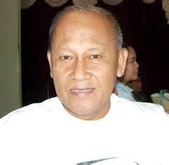
There were five severe attacks on the media around the world between last Saturday and Thursday, resulting in two journalists' murders, one court approval for the closure of a media house, seizure of print-run from 14 newspapers in one country and warning to media outlets to distance Charlie Hebod cartoons.
According to the Committee for Protection of Journalists, CPJ, news reports, the two murders happened last Saturday, one each in Colombia and the Philippines.
Luis Carlos Peralta Cuellar was gunned down in his home Colombia and his wife shot on the shoulder, but responding to treatment. And Maurito Lim fell victim to gunmen in the Philippines. Both men were radio journalists. Aside from the murder of the two journalists, there were other reported attacks in Sudan, Kuwait and Russia that attracted CPJ's condemnations.
According to the Committee for Protection of Journalists, CPJ, news reports, the two murders happened last Saturday, one each in Colombia and the Philippines.
Luis Carlos Peralta Cuellar was gunned down in his home Colombia and his wife shot on the shoulder, but responding to treatment. And Maurito Lim fell victim to gunmen in the Philippines. Both men were radio journalists. Aside from the murder of the two journalists, there were other reported attacks in Sudan, Kuwait and Russia that attracted CPJ's condemnations.
Greste journeys into freedom
By Abi Giwa
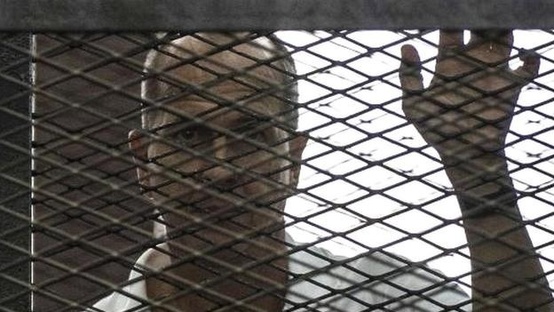
Peter Greste, an Australian journalist, jailed alongside two Al-Jazeera journalists in Egypt for alleged bias reporting, has been released by the Egyptian authorities.
According to a report by the BBC, Greste has been deported from Egypt to Australia. The report said that the Egyptian authorities are silent on the fate of two Al-Jazeera journalists jailed alongside Greste for same offense.
Al-Jazeera in a tweet welcomed Greste's release and requested for Messrs Fahmy and Baher's release.
An Egyptian official is reported as having said in a report by Agence France-Presse that there is a presidential decision to deport Greste to Australia.
According to a report by the BBC, Greste has been deported from Egypt to Australia. The report said that the Egyptian authorities are silent on the fate of two Al-Jazeera journalists jailed alongside Greste for same offense.
Al-Jazeera in a tweet welcomed Greste's release and requested for Messrs Fahmy and Baher's release.
An Egyptian official is reported as having said in a report by Agence France-Presse that there is a presidential decision to deport Greste to Australia.
Newspaper banned for negative reporting and cartooning
25 January 2015 By Abi Giwa

A newspaper has been banned. And the reason given for the banning is different from the reason it has been banned. You don't get the real gist until you have read to the middle of the news report.
The lead tells the reader the paper has been banned because it has not been registered in the country for twenty years. After about five paragraphs of reporting, you come to a paragraph that says the newspaper's Bureau Chief has been grilled over reporting and accused of negative agenda against its host country.
This is about a matter between Tanzania and the East African Newspaper, banned in Tanzania last week for negative reporting and distasteful cartooning.
The lead tells the reader the paper has been banned because it has not been registered in the country for twenty years. After about five paragraphs of reporting, you come to a paragraph that says the newspaper's Bureau Chief has been grilled over reporting and accused of negative agenda against its host country.
This is about a matter between Tanzania and the East African Newspaper, banned in Tanzania last week for negative reporting and distasteful cartooning.
New book, unsolved murders and media freedom
17 December 2014 By Abi Giwa
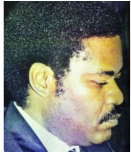
Journalists are beheaded; they are bombed and shot to death. They are arrested and hounded into jail, and have become targets for combatants in warfare, who seek to settle scores, based on political and ideological differences. And there are many unresolved journalists' assassinations around the world, recalling a new book on the assassination a Nigerian journalist - Dele Giwa - with a bomb, in his home on October 19, 1986.
Dele Giwa's younger brother reports in detail, based on a study of the new book, a study of a review by an independent writer, interviews on the new book and the state of media freedom around the world, amid new dangers journalists face on the job.
"Honour for Sale", authored by Debo Basorun former of the Nigerian Army, has become controversial like the assassination case the book set to resolve, believably unresolved for twenty eight years, involving the country's former dictator, Ibrahim Babangida, and two of the country's military intelligence officers.
Dele Giwa's younger brother reports in detail, based on a study of the new book, a study of a review by an independent writer, interviews on the new book and the state of media freedom around the world, amid new dangers journalists face on the job.
"Honour for Sale", authored by Debo Basorun former of the Nigerian Army, has become controversial like the assassination case the book set to resolve, believably unresolved for twenty eight years, involving the country's former dictator, Ibrahim Babangida, and two of the country's military intelligence officers.
Paul Thek's arts
By a Correspondent
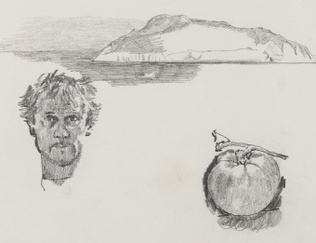
Paul Thek: Ponza and Roma is the first exhibition to examine the paintings and drawings Thek made in Italy during the 1970s.
Following three sensational exhibitions of his wax meat pieces and the lost legendary installation The Tomb at New York's Stable and Pace Galleries in the 1960s, Thek spent a significant part of the 1970s in Europe.
While there he created a series of large scale collaborative installations constructed from transitory materials such as sand, newspaper and trees. These installations were exhibited at the Stedelijk Museum, Amsterdam; the Moderna Museet, Stockholm; “Documenta V,” Kassel; the Kunstmuseum Lucerne and Wilhelm-Lehmbruck-Museum der Stadt Duisburg.
Concurrently, Thek worked on the Mediterranean island of Ponza and in a flat in Trastevere, having first visited Ponza in 1968.
On Ponza, Thek captured the dramatic landscape of the island in traditional media of pencil, watercolor and oil paint. In Rome, he executed numerous paintings on spreads of the International Herald Tribune. A large number of these newspaper paintings were shown at Iolas Gallery in Paris in 1975.
These works include images of Ponza, the sea, an eggplant, and a grape trellis as well as enigmatic personae such as a hot potato with arms and legs, and figures with globes or a valentine shaped heart for a head. Many of these images, and the Ponza motifs, are noted or sketched in Thek's notebooks, a selection of which is included in Paul Thek: Ponza and Roma.
Following three sensational exhibitions of his wax meat pieces and the lost legendary installation The Tomb at New York's Stable and Pace Galleries in the 1960s, Thek spent a significant part of the 1970s in Europe.
While there he created a series of large scale collaborative installations constructed from transitory materials such as sand, newspaper and trees. These installations were exhibited at the Stedelijk Museum, Amsterdam; the Moderna Museet, Stockholm; “Documenta V,” Kassel; the Kunstmuseum Lucerne and Wilhelm-Lehmbruck-Museum der Stadt Duisburg.
Concurrently, Thek worked on the Mediterranean island of Ponza and in a flat in Trastevere, having first visited Ponza in 1968.
On Ponza, Thek captured the dramatic landscape of the island in traditional media of pencil, watercolor and oil paint. In Rome, he executed numerous paintings on spreads of the International Herald Tribune. A large number of these newspaper paintings were shown at Iolas Gallery in Paris in 1975.
These works include images of Ponza, the sea, an eggplant, and a grape trellis as well as enigmatic personae such as a hot potato with arms and legs, and figures with globes or a valentine shaped heart for a head. Many of these images, and the Ponza motifs, are noted or sketched in Thek's notebooks, a selection of which is included in Paul Thek: Ponza and Roma.
Charlie Hebdo's new day and sacredness
By Abi Giwa

For the Charlie Hebdo magazine, today is a new day, another Wednesday, different from last Wednesday, exactly eight days ago, when gun men raided the magazine's office in Paris and killed 12 people.
The magazine is defiant of the terror's intention to control its editorial policy. Rather than be cowed, the magazine has reportedly printed a memorial edition, with yet the picture of a man who caused the terror visit to its office, on the cover. The man on the cover is depicted as crying, and saying he has forgiven all.
Reports say that the day's edition of the magazine has a print run of three million copies and have been selling like hot cakes, and the magazine's editors are thinking of printing additional two million copies on Thursday.
The magazine is defiant of the terror's intention to control its editorial policy. Rather than be cowed, the magazine has reportedly printed a memorial edition, with yet the picture of a man who caused the terror visit to its office, on the cover. The man on the cover is depicted as crying, and saying he has forgiven all.
Reports say that the day's edition of the magazine has a print run of three million copies and have been selling like hot cakes, and the magazine's editors are thinking of printing additional two million copies on Thursday.
New danger journalists face on the job
By Abi Giwa

While the police in France are working to arrest the terrorists who have killed journalists and policemen in the country, discussions will continue on the new danger journalists face on the job. The signals of the new danger emerged with the beheadings of James Foley and Steven Sotloff in Syria by the ISIS terrorists.
The difference between beheadings of the two American journalists in Syria and the attack on Charles Hebdo magazine Foley and Sotloff was that some observers considered Foley and Sotloff as victims of a war - and their killing as indirect declaration of war on journalism by terrorists. And that the ISIS used the American citizenship of Foley and Sotloff as a cover to indirectly attack the Fourth Estate, unlike what happened in Paris - an outright declaration of war against the Fourth Estate.
A newspaper office came under direct attack by armed gun men. They killed the editor-in chief and 11 staffers, because of what news reports described as the newspaper's decision to exercise freedom by publishing what it deemed fit, based on its news and editorial judgment, against the terrorists' wish to remotely edit the newspaper for the editors. The editors rejection of terror to influence their news and editorial judgment led to an attack and deaths on the job.
The difference between beheadings of the two American journalists in Syria and the attack on Charles Hebdo magazine Foley and Sotloff was that some observers considered Foley and Sotloff as victims of a war - and their killing as indirect declaration of war on journalism by terrorists. And that the ISIS used the American citizenship of Foley and Sotloff as a cover to indirectly attack the Fourth Estate, unlike what happened in Paris - an outright declaration of war against the Fourth Estate.
A newspaper office came under direct attack by armed gun men. They killed the editor-in chief and 11 staffers, because of what news reports described as the newspaper's decision to exercise freedom by publishing what it deemed fit, based on its news and editorial judgment, against the terrorists' wish to remotely edit the newspaper for the editors. The editors rejection of terror to influence their news and editorial judgment led to an attack and deaths on the job.
John Lennon at Outlimits studio
By Abi Giwa
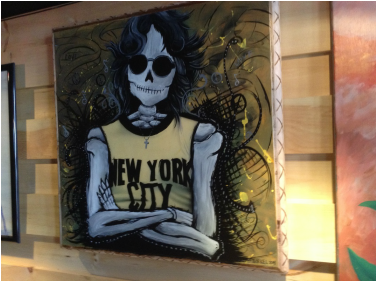
Darrien Borkel is the curator at Outlimits Art Studio on Franklin Ave. area of Franklin Square, Long Island, New York.
He said he had existed on the address for 20 years, while he had lived in the area for 30 years. He was born in Hicksville and had all his education in Long Island.
He has a year book in the studio where photographs of all teachers who have been instrumental into developing his art education are printed.
Once inside the art studio, the serving of a drink from a bucket under a platform in a bar invites curiosity. The drink is named Kava Kava, which Darrien said he first discovered in Florida and introduced in his studio on Franklin Ave. He said the drink completely relaxes one after consumption.
Above on a lintel of the bar is an inscription, "Kava Kava is primarily consumed to relax without disrupting mental clarity."
Darrien said Kava Kava is made of water and kava root. He said he sometimes adds clove and pineapple, trying new recipes.(Read More)
Twelve Windows
By A Correspondent
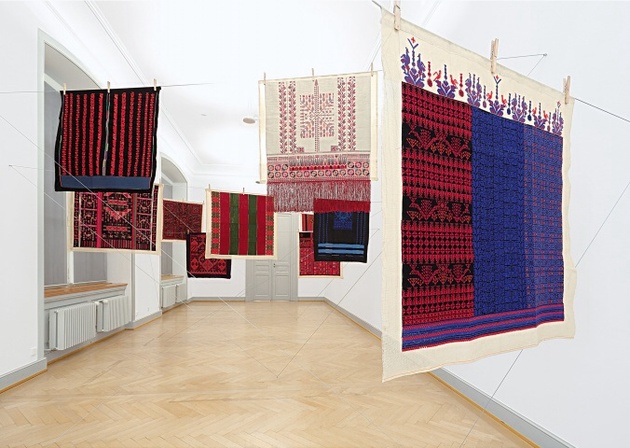
Mona Hatoum's exhibition titled Twelve Windows begins 13 September 2014, at Alexander and Bonin, 10th Avenue, New York City. On view will be Twelve Windows, an installation that comprises one-meter-square embroidered pieces of fabric, attached with wooden cloth pins at irregular intervals to a steel cable, which traverses the room.
These twelve embroidered panels are the work of Inaash; a Lebanese NGO founded in 1969 to provide employment for Palestinian women in refugee camps in Lebanon. Researched and designed by Malak Husseini Abdulrahim
These twelve embroidered panels are the work of Inaash; a Lebanese NGO founded in 1969 to provide employment for Palestinian women in refugee camps in Lebanon. Researched and designed by Malak Husseini Abdulrahim
Elmont Library celebrates 75 years
20 October 2014 By Abi Giwa

Dozens of Elmont residents in Long Island, New York, turned out on September 21 and celebrated 75 year anniversary of the Elmont Library. And library officials thanked patrons and attendees for continued support. Among the crowd at the occasion were veterans and volunteer fire fighters and a spirited performance by the Doo Wop Classic All Stars.
"This day could not have been possible without the community," library trustee Tammie Williams told a large audience in the library's 6, 400 square foot theater.
"So many people support the library," board president Monique Hardid added, thanking the audience. The all stars brought listeners to their feet and moved them to dance around the theater to a rendition of Teddy Pendergrass's "You are My Latest, My Greatest Inspiration."
Celebrated pianist John Arden, of Island Park, winner of New York Independent Music Festival, wowed the audience with his "dueling piano" performance. Green Meadow's Farm, from Flora Park, presented a live animal show, and the Petra Puppets Theater Company delighted both children and adult alike. (Read More)
"This day could not have been possible without the community," library trustee Tammie Williams told a large audience in the library's 6, 400 square foot theater.
"So many people support the library," board president Monique Hardid added, thanking the audience. The all stars brought listeners to their feet and moved them to dance around the theater to a rendition of Teddy Pendergrass's "You are My Latest, My Greatest Inspiration."
Celebrated pianist John Arden, of Island Park, winner of New York Independent Music Festival, wowed the audience with his "dueling piano" performance. Green Meadow's Farm, from Flora Park, presented a live animal show, and the Petra Puppets Theater Company delighted both children and adult alike. (Read More)
ISIS butchers another American journalist
By Abi Giwa
 Sotloff
Sotloff
Steven Sotloff, an American freelance journalist is feared to have been executed in Syria by beheading, based on a video released by the dreadful ISIS militants on Tuesday.
Just last week, Steven's mother, fearing the worst following James Foley's beheading made an emotional appeal for the ISIS's leader to release her son.
Just last week, Steven's mother, fearing the worst following James Foley's beheading made an emotional appeal for the ISIS's leader to release her son.
Wicked Impotence
By Abi Giwa
 Giwa
Giwa
The impotence in discourse here is not what makes a man looks like a whimp before a woman. Agreeably, impotence comes in various forms characterizing weakness. But the most popular one known to people is when a man is lacking the ability to show a woman that he is indeed a man. One can never know about the wickedness of sexual impotence until one has seen or read about a man, who has made a woman's affection nought for inability to give it to her and make her happy. Let us turn to Ernest Hemingway in this regard…..
Kanye and Kardashian tie knot in Paris
 Paris Paris
Every writer familiar with Ernest Hemingway's first work, The Sun Also Rises, on hearing about Kim and Kanye's marriage in Paris, will remember the group of Americans in that piece of literature and their journey to watch a Bull fight. Apart from the group of Americans who went for the Bull fight in 'The Sun Also Rises', there was also a group of American writers, who chose Paris as their home, beginning with Richard Wright, James Baldwin, Ernest Hemingway etc.
|
Foley's beheading and journalism's burden
|
|
Jay Leno: Hard to Say Goodbye
|
Aheam and Torres' Exhibition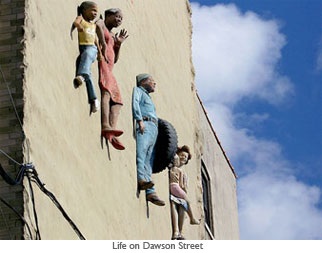
On Saturday, January 11, 2014, Alexander and Bonin opened an exhibition of sculptures made by John Aheam in collaboration with Rigoberto Torres between 1961 and 1991 in Aheam's first South Bronx studios. Works from Dawson Street and Walton Avenue include full figure castings such as Double Dutch and Raymond (Rat Killer), as well as three-quarter figure castings and busts of neighbors and friends in the South Bronx.
|
If Wishes Were Horses 13 October 2013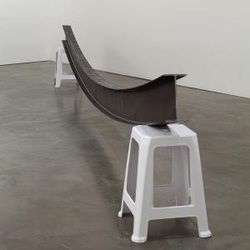
Alexander and Bonin announce If wishes were horses… an exhibition of new works by Willie Cole. For this exhibition, Cole has created three large paintings and two sculptures signaling a significant shift in the scale of his work.
These works demonstrate Cole’s continued interest in the Yoruba religion and, in particular, the Orisa (Yoruba deities) which represent specific forces of nature and govern different parts of the universe. |
Bieber's Troubles and Damage Control
|
Paparrazi and Celebrities
|
Bieber's 'Bad Day' amid Bad Days
|
Welcome to Ibsen's Doll House
|
Miley Cyrus as an Example of Success
|
Radio Host's Promising Ladder
|
2013 Nobel Prize Surprises
|
The World against Poverty and Ignorance
|
Arts
|
Queen Latifah's Show Debuts
|
Books/ Growing Up Amid Uncertainties
Journey to the Future Begins (1)
Published: 22 July 2013 By Abiodun Giwa

The joy of going to school, created by the lifestyle of new elites, following independence was manifestly limitless.
Obviously, education paved the way for emerging elites into public service, hitherto preserved for colonial officers and positions that were thought could be occupied by the local. It stirred parents' desire to want their children among a new set of bureaucrats, adjudged new leaders with unlimited access to good life. The lists of goodies are endless; like the proverbial life in paradise.
It is like saying if you have education, you are the master, a special specie of human being, different from others; and if you don't have it, a dimwit and a moron, looked down upon, and seeing as incapable of bringing pride to family and community. The hope for education, a job in government or the new commerce was intoxicating. The uneducated or those who had missed the opportunity and could no longer be counted among the favored were determined to move their families up the ladder of progress.
(This is part of Chapter 1 in "Growing Up Amid Uncertainties").
Obviously, education paved the way for emerging elites into public service, hitherto preserved for colonial officers and positions that were thought could be occupied by the local. It stirred parents' desire to want their children among a new set of bureaucrats, adjudged new leaders with unlimited access to good life. The lists of goodies are endless; like the proverbial life in paradise.
It is like saying if you have education, you are the master, a special specie of human being, different from others; and if you don't have it, a dimwit and a moron, looked down upon, and seeing as incapable of bringing pride to family and community. The hope for education, a job in government or the new commerce was intoxicating. The uneducated or those who had missed the opportunity and could no longer be counted among the favored were determined to move their families up the ladder of progress.
(This is part of Chapter 1 in "Growing Up Amid Uncertainties").
Troubles, Lessons and Strides (2)
Published: 30 July 2013 By Abiodun Giwa

On a Monday, the teacher will ask the pupils to bring money for chalks or bring the chalks for use in the class; on Wednesday,the demand will be for the cup the pupil will use for drinking water and on Friday, an announcement
may be made for money to get charcoals to be mixed with water for the darkening of the black board.
The following week, the demand will go a step higher, higher and higher, like it had turned into a curse. A lot of parents hated it. For them it amounted to asking them to pay for education that had been free a year earlier.
The most disgusting to pupils was that souvenirs like the country flags, cups and other mementoes that were used to mark the country’s independence anniversary, which had been part of the attraction to school, vanished. The development, simple as it seemed, led some parents to withdraw their kids from school, because they could not afford the money. But for those parents who had discovered that education was the nucleus needed for the future advancement of their kids and family, there was no going back.
(This is second part of chapter 1 in "Growing Up Amid Uncertainties").
may be made for money to get charcoals to be mixed with water for the darkening of the black board.
The following week, the demand will go a step higher, higher and higher, like it had turned into a curse. A lot of parents hated it. For them it amounted to asking them to pay for education that had been free a year earlier.
The most disgusting to pupils was that souvenirs like the country flags, cups and other mementoes that were used to mark the country’s independence anniversary, which had been part of the attraction to school, vanished. The development, simple as it seemed, led some parents to withdraw their kids from school, because they could not afford the money. But for those parents who had discovered that education was the nucleus needed for the future advancement of their kids and family, there was no going back.
(This is second part of chapter 1 in "Growing Up Amid Uncertainties").
Joy of Growing and Learning, Prior to Unwarranted Roadblocks (3)
Published: 8 August 2013 By Abiodun Giwa

Happy School Kids
I remember vividly the joy exuded by all children at morning assembly session, especially after we had progressed to the third class and closed late in the afternoons with senior class three to six in the same assembly. I found the late afternoon assembly was more enjoyable than the morning session.
Earlier, during our first and second year, classes closed on Fridays with senior kids, I had a taste of what the closing
assembly was for the big boys and girls. I looked forward to getting to the third year, to be a permanent part of the afternoon rendezvous, admirable dancing and display of what seemed like an eternal joy.
After the sweetness of the assembly session in the morning, we came face to face with the learning process. Learning how to write A, B, C to Z did not come easy. The more the teacher pushed the effort, the more the message and its reality sunk into the brain. Along went the learning how to write 1, 2, 3, first to 10; then to 20 and further. It never came easy.
But with the teacher’s patience, helping the children to flow along, the practice turned into acquisition of knowledge and to near perfection.
Earlier, during our first and second year, classes closed on Fridays with senior kids, I had a taste of what the closing
assembly was for the big boys and girls. I looked forward to getting to the third year, to be a permanent part of the afternoon rendezvous, admirable dancing and display of what seemed like an eternal joy.
After the sweetness of the assembly session in the morning, we came face to face with the learning process. Learning how to write A, B, C to Z did not come easy. The more the teacher pushed the effort, the more the message and its reality sunk into the brain. Along went the learning how to write 1, 2, 3, first to 10; then to 20 and further. It never came easy.
But with the teacher’s patience, helping the children to flow along, the practice turned into acquisition of knowledge and to near perfection.
Navigating a Delicate Bend and My Father's Wrong Choices (4)
Published: 19 August 2013 By Abiodun Giwa

The author
The sun shone brightly in the horizon, and there were smiles on the faces of people around me. But for me, in comparison with people around me, there was dullness and a gloom that arose from problems about uncertainty of the future. I had just emerged from a discussion with my father over whether I would like to be apprenticed to learn bicycle repairing. He had said he had no money to pay for my high school education.
A seeming darkness pervaded my sensibility even though it was midday. I could not comprehend why he wanted me to learn bicycle repairing when my oldest brother was in a middle school and my immediate brother was learning photography. I did not see any future in bicycle repairing. I knew my father would no have deliberately set me on a path that I viewed as unpromising. I thought there were better trades or at worst, he could have asked me to wait until he could provide the money for me to proceed to high school.
A seeming darkness pervaded my sensibility even though it was midday. I could not comprehend why he wanted me to learn bicycle repairing when my oldest brother was in a middle school and my immediate brother was learning photography. I did not see any future in bicycle repairing. I knew my father would no have deliberately set me on a path that I viewed as unpromising. I thought there were better trades or at worst, he could have asked me to wait until he could provide the money for me to proceed to high school.
Foundation for Future Crisis (5)
Published: 1 September 2013 By Abiodun Giwa

Abiodun Giwa
“Welcome Ofaiko.” Ai greeted the woman, using the word Ofaiko’, which means a new wife in Etsako people’s dialect, as we stepped into the large parlor. It did not sound funny to me nor did it seemed absurd. I was a kid. I did not know the implication of what my father had done. I did not see any opposition from my mother compared to the opposition she had put up against an earlier love aff air by my father which she termed an illicit aff air. Perhaps, she thought it was safer for him to be with someone known in the household than hanging out with a free woman outside the house.
The first implication of the new arrivals was that our population in the house increased by two. Now, we were told the woman Musa had earlier intended taking as a second wife, who was in the care of his family went with another man, when she learnt Musa was no more interested in having a second wife.The woman he brought was searched out for him in a hurry. In this relationship of total strangers, the beginning was sweet. The new wife, El and her brother, Yak, joined the work in the farm, like the rest of us they met in the house, except our eldest brother who had left to live with a childhood friend a block away from the house. She shared the kitchen with Ai. They prepared food together.
The first implication of the new arrivals was that our population in the house increased by two. Now, we were told the woman Musa had earlier intended taking as a second wife, who was in the care of his family went with another man, when she learnt Musa was no more interested in having a second wife.The woman he brought was searched out for him in a hurry. In this relationship of total strangers, the beginning was sweet. The new wife, El and her brother, Yak, joined the work in the farm, like the rest of us they met in the house, except our eldest brother who had left to live with a childhood friend a block away from the house. She shared the kitchen with Ai. They prepared food together.
My Country: Dark Tunnel and a Trap for Children (6)
Published: September 2013 By Abiodun Giwa
 Nigerian map
Nigerian map
I was not supposed to be at work but school. There was no where for me to take my protest. I was already sixteen. Happily because I stopped work in the bookshop, Musa did not leave me to stay at home, doing nothing. He made me to join him in his laundry work to the extent that most of the students thought I had myself turned into a laundry man.
I felt ashamed for students to see me with bundle of wet clothes on my head coming from the fish pond, where the washing was done or standing in the open behind one of the dorms arranging wet clothes on lines, with both male and female students watching me, while they go to the dining. I tried all I could to avoid it to no avail. There was nothing I could do about it. And like a stroke of more shame coming my way, the work with Musa in the college, which I thought would be brief soon turned into what seemed like a permanent affair, when Musa suddenly took ill with a swollen right foot, cut off from work and needed someone to take his place at work for him to continue to have income to take care of his home. The mantle to keep Musa’s work fell on me because I was not in school or in any employment. My decision to leave the bookshop became a blessing in disguise.
I felt ashamed for students to see me with bundle of wet clothes on my head coming from the fish pond, where the washing was done or standing in the open behind one of the dorms arranging wet clothes on lines, with both male and female students watching me, while they go to the dining. I tried all I could to avoid it to no avail. There was nothing I could do about it. And like a stroke of more shame coming my way, the work with Musa in the college, which I thought would be brief soon turned into what seemed like a permanent affair, when Musa suddenly took ill with a swollen right foot, cut off from work and needed someone to take his place at work for him to continue to have income to take care of his home. The mantle to keep Musa’s work fell on me because I was not in school or in any employment. My decision to leave the bookshop became a blessing in disguise.
Children of the Rich, Children of the Poor (7)
Published: 10 October 2013 By Abiodun Giwa
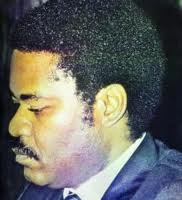 Dele Giwa
Dele Giwa
The following day, a Saturday, the day Dele had chosen for us to go and see the principal, I woke very early in the morning ahead of everyone in the household. As early as seven, I was dressed to avoid a situation where Dele would found I was not ready. Fully dressed up, I kept a vigil at the door. The matter was that serious. It seemed like the last opportunity that I had for high school admission. I was at the door for over one hour before Dele’s arrival at about eight thirty. El had also woken early to prepare a mouth watering breakfast which aroma was not hidden.
After he had greeted El and other neighbors, he had a breakfast of pap and beans cake before we stepped out toward the college about few minutes to nine. Dele did not talk much on our way. I did not have anything to say either. We went past a place called the heaven of the king of Benin. I saw that Dele looked at the place where a mould of about five feet permanently seated on the spot. After that, we went past the prison, the only one in the town, and then we walked past St. John’s Primary School where I did the last repetition of the elementary final class.
After he had greeted El and other neighbors, he had a breakfast of pap and beans cake before we stepped out toward the college about few minutes to nine. Dele did not talk much on our way. I did not have anything to say either. We went past a place called the heaven of the king of Benin. I saw that Dele looked at the place where a mould of about five feet permanently seated on the spot. After that, we went past the prison, the only one in the town, and then we walked past St. John’s Primary School where I did the last repetition of the elementary final class.
Family: Sacrifice and Renewal
Published: 19 October 2013 By Abiodun Giwa
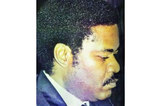 Dele Giwa
Dele Giwa
Having ensured my admission into a high school Dele traveled to Afashio, where he saw our mother who was recuperating from an illness. The information about Ai’s improved health, which he brought back from his journey, brightened our expectation that Ai might soon be returning to join the family. The fear of death was overcome in her case. The good news of her health eclipsed whatever gloom, which her absence had cast over our lives.
We savored the grasp of a double joy, a necessary mark of renewal that put recent sad experiences behind us. Before Dele’s arrival from Afashio, Musa had invited a prayer group that offered prayers titled ‘Yasin’, said to be potent and famous among Moslems, at tackling and expelling evil, to tackle the source of what was to us an intermittent problem in the household, which cause remained a mystery. It was announced that the reason for the prayer was for protection and guidance for Dele who was traveling abroad.
We savored the grasp of a double joy, a necessary mark of renewal that put recent sad experiences behind us. Before Dele’s arrival from Afashio, Musa had invited a prayer group that offered prayers titled ‘Yasin’, said to be potent and famous among Moslems, at tackling and expelling evil, to tackle the source of what was to us an intermittent problem in the household, which cause remained a mystery. It was announced that the reason for the prayer was for protection and guidance for Dele who was traveling abroad.
Alicia Keys "Brand New Me" Resonates at Citizenship Oath Ceremony
Published: 17 April 2013 By Abiodun Giwa

Alicia Keys
This is a story about a woman's journey from Rwanda to the United States after escaping from a throe of death then. She now feels like what Alicia Key sings in "Brand New Me", a song that is rivetingly captivating and winning converts who share the message of rebrith the song conveys.
At a swearing-in-ceremony for new citizens reported by the CBS, Immaculee Ilibagiza, the Rwandan genocide survivor said,"I feel like a person that I am supposed to be." Meaning she is a brand new person, following rebirth of becoming a citizen of the U.S.
At a swearing-in-ceremony for new citizens reported by the CBS, Immaculee Ilibagiza, the Rwandan genocide survivor said,"I feel like a person that I am supposed to be." Meaning she is a brand new person, following rebirth of becoming a citizen of the U.S.
Music as Elixir
|
Helping Girls Realize Fashion Dreams
|
Chinua Achebe, author of "Things Fall Apart'' Dies
Published: 22 March 2013

A world renowned author and an African literary giant, Chinua Achebe, has been reported dead in Nigeria. But can Achebe ever die with the mammoth literary works he is leaving behind? Literally, he has transformed, but will live forever in his works like "Things Fall Apart" and "No longer At Ease" among others that are read all over the world.
The literary Octopus had followed the path of another great Nigerian, Timothy Obadare, a preacher of the word of God in unadulterated manner who also died yesterday in Akure. Achebe died at the age of 82 and Obadare at 83.
The literary Octopus had followed the path of another great Nigerian, Timothy Obadare, a preacher of the word of God in unadulterated manner who also died yesterday in Akure. Achebe died at the age of 82 and Obadare at 83.
Restroom Maintenance Leads to Treasure
|
A Bridge as a Piece of Art
|
History of Women's World Banking- a Review
Piblished: December 21, 2012 By Abiodun Giwa
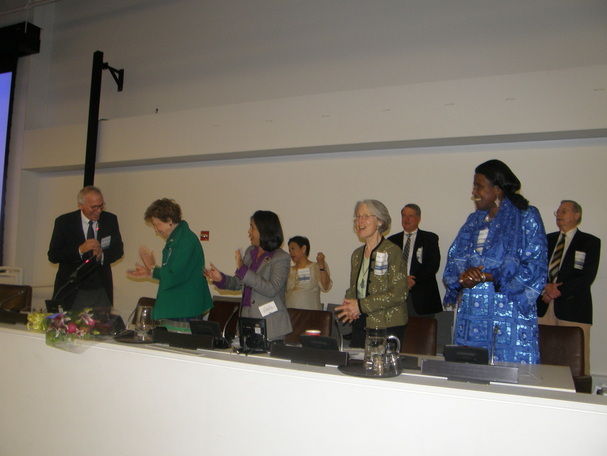
Dignitaries at the launching of 'Founding A Movement Women's World Banking 1975-1990.'
Founding A Movement, Women's World Banking, 1979-1990 is a compendium about the beginning and growth of micro credit for less privileged women known as Women's World Banking, WWB. The story begins in 1975 at the first United Nation's conference for women in Mexico City.
The book opens with a compilation of 6 quotations subititled, Praise For founding a Movement, proceeds with a note of gratitude by the author, followed by a short note, a prologue, timeline-A Sense of History, and WWB Affliates' World. It explains how and why WWB is Officially registered as the Stichting to Promote Women's World Bankng or SWWB. The word 'stichting' in Dutch means foundation. But before the progress leading to the registration and foundation, there are activities recorded in the book worthy of note.
The pre-registration acitivities comprise the birth of an idea, thoughts to give the idea a life, determination by those privileged with the task to not abort it amid challenges, benefit of dissent, can do spirit, conflicts and resolutions, words of men and women who stand behind the founders toward the realization of a dream.
The Beginning
It is recorded in the first chapter, From Kansa's City to Mexico City, begins with a rider, Too High Risk for Women that shows the strength of WWB's foundation a reflection of Michaela Walsh's life's character and experience, as a woman and an American. The character and experience are linked to her root and foundation of public life laid by her grandfather, Patrick P. Walsh, co- author of congressional proposal for the child labor law, eight hours work day and part of a struggle to ensure living wages for workers. She has a natural talent of kicking obstacles off her path. Her first demonstration of this act was her resignation from Merryl Lynch after a denial of being part of the company's foundation in Beirut, embarks on a journey to Beirut on her own to be hired by the same company. In Beirut she witnesses a new culture and learns to question new assumptions, and grasps a knowledge that there are many ways to achieve result. Her working abroad in other cultures, returning to New York after learning of women's little access to the economy leads to a vast acquisition of knowledge about problems that confront women outside the U.S. Becoming a program associate at the Rockfeller Brothers Fund, RBF, turns into a springboard for further actions, and going as a delegate to the first World Conference on Women becomes a strategy. Yes, this book is about strategies of working to achieve success in a difficult situation.
The book notes that Mexico City in the summer of 1975 reflects new understanding of economic condition of women, based on a paper by Ester Boserup, a Danish economist and a writer for the United Nations who writes, "Women perform over 60% of the world's work, earn only 10% of the income and own less than 1% of the world's property."
The Idea and Crystalization
At the UN conference, Esther Ocloo of Ghana, during discusions of the problems of women farmers and lack of access to credit due to lack of collateral appeals for a women's bank. ChoKyun ,Rha, a representative of Far Eastern countries writes how Esther Ocloo, a penniless orphan at adolsecence has received one quarter in cash from an aunt as first money she has ever possessed and determines to do something out of it to change her future. She owns a glass jar, goes around collecting berries, makes jam and sells it; it is how she becomes an enterpreneur, and understands the importance of having financial means to begin a venture. The idea of women's banking develops from there. After the meeting, the women retire into the an hotel room, and begin drafting the resolutions for WWB. One of their discussions revolves around how women would have access to power, and recalls how Michaela has said that unless women have access to credit and money, they all not have the power. She brings a handful into the idea and keeps the contact. She is described as powering and like a beacon working from beginning to end. There is acknowledgment that there have been village credit unions before WWB, but don't serve the women. To this, Ocloo says she is tired of those she describes as money lenders, and says what they need is a women's world bank.
Success
By the time of their next meeting in Amsterdam in 1980, the WWB has taken shape and their remark has become, "It will happen you said, and it did." Bill Dietel says at the end of the day, it's people, not money, and not even ideas." Ideas are always out there; the money is always out there somewhere. But nothing happens until a person grabs the idea, gets the money and makes it go." Along with team spirit of interns, volunteers and overworked staff the WWB's goal has been realized, history of its operations from 1975-1990 documented in a properly edited and easy to read language, representing the voice of all the participants and the paper works.
The book opens with a compilation of 6 quotations subititled, Praise For founding a Movement, proceeds with a note of gratitude by the author, followed by a short note, a prologue, timeline-A Sense of History, and WWB Affliates' World. It explains how and why WWB is Officially registered as the Stichting to Promote Women's World Bankng or SWWB. The word 'stichting' in Dutch means foundation. But before the progress leading to the registration and foundation, there are activities recorded in the book worthy of note.
The pre-registration acitivities comprise the birth of an idea, thoughts to give the idea a life, determination by those privileged with the task to not abort it amid challenges, benefit of dissent, can do spirit, conflicts and resolutions, words of men and women who stand behind the founders toward the realization of a dream.
The Beginning
It is recorded in the first chapter, From Kansa's City to Mexico City, begins with a rider, Too High Risk for Women that shows the strength of WWB's foundation a reflection of Michaela Walsh's life's character and experience, as a woman and an American. The character and experience are linked to her root and foundation of public life laid by her grandfather, Patrick P. Walsh, co- author of congressional proposal for the child labor law, eight hours work day and part of a struggle to ensure living wages for workers. She has a natural talent of kicking obstacles off her path. Her first demonstration of this act was her resignation from Merryl Lynch after a denial of being part of the company's foundation in Beirut, embarks on a journey to Beirut on her own to be hired by the same company. In Beirut she witnesses a new culture and learns to question new assumptions, and grasps a knowledge that there are many ways to achieve result. Her working abroad in other cultures, returning to New York after learning of women's little access to the economy leads to a vast acquisition of knowledge about problems that confront women outside the U.S. Becoming a program associate at the Rockfeller Brothers Fund, RBF, turns into a springboard for further actions, and going as a delegate to the first World Conference on Women becomes a strategy. Yes, this book is about strategies of working to achieve success in a difficult situation.
The book notes that Mexico City in the summer of 1975 reflects new understanding of economic condition of women, based on a paper by Ester Boserup, a Danish economist and a writer for the United Nations who writes, "Women perform over 60% of the world's work, earn only 10% of the income and own less than 1% of the world's property."
The Idea and Crystalization
At the UN conference, Esther Ocloo of Ghana, during discusions of the problems of women farmers and lack of access to credit due to lack of collateral appeals for a women's bank. ChoKyun ,Rha, a representative of Far Eastern countries writes how Esther Ocloo, a penniless orphan at adolsecence has received one quarter in cash from an aunt as first money she has ever possessed and determines to do something out of it to change her future. She owns a glass jar, goes around collecting berries, makes jam and sells it; it is how she becomes an enterpreneur, and understands the importance of having financial means to begin a venture. The idea of women's banking develops from there. After the meeting, the women retire into the an hotel room, and begin drafting the resolutions for WWB. One of their discussions revolves around how women would have access to power, and recalls how Michaela has said that unless women have access to credit and money, they all not have the power. She brings a handful into the idea and keeps the contact. She is described as powering and like a beacon working from beginning to end. There is acknowledgment that there have been village credit unions before WWB, but don't serve the women. To this, Ocloo says she is tired of those she describes as money lenders, and says what they need is a women's world bank.
Success
By the time of their next meeting in Amsterdam in 1980, the WWB has taken shape and their remark has become, "It will happen you said, and it did." Bill Dietel says at the end of the day, it's people, not money, and not even ideas." Ideas are always out there; the money is always out there somewhere. But nothing happens until a person grabs the idea, gets the money and makes it go." Along with team spirit of interns, volunteers and overworked staff the WWB's goal has been realized, history of its operations from 1975-1990 documented in a properly edited and easy to read language, representing the voice of all the participants and the paper works.
Growing Up Amid Uncertainties
-A Book Review
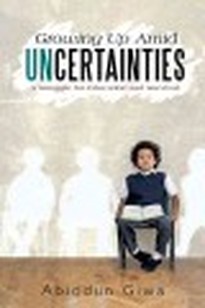
When a child is born, he or she doesn't know what the future will be, just like the parents. All the parents are capable of doing is help care for the child through infancy, adolescence to adulthood.
During period of growth, some children have parents with enough material wealth to bestow a good care, while others are not so fortunate. It is what informs Shakespeare's words that some are born great, some have greatness thrust upon them and some achieve greatness, because people are not equally endowed.
Each child, after growing into adulthood, knows what he or she has experienced growing up. The child knows whether the parents are well off financially and if not, the child will know how the parents have managed to bring him or her up.
The story here chronicles an experience about a child who grows up in a situation like poverty, where the parents are aware of their responsibilities, struggle and give their best toward the child's growth and mental development. The story gives a glimpse about living and growing up in a bad political and economic environment, where residents are uncertain of tomorrow, and children from poor background are uncertain of education. The story is located in Nigeria, one of the most populous countries on earth, and an oil rich nation.
However, poor parents' strive to ensure children from their household don't become servants and be part of governance that colonialists are leaving behind as they leave; parents ensure education to their children at all cost, even if they have to commit all their lives investments. It is the beginning of a competition among household, rich or poor, to give education to children as a bridge to a meaningful life. In the circumstance, many children from poor homes fall by the way side, while only few manage to struggle to remain relevant in the scheme of affairs.
The protagonist remains in an elementary school when he is supposed to be earning a high school education, repeating class after class, while he waits for his parents to earn enough money for his high school education. He enters the high school at 17, and begins to savor the joy. Suddenly he leaves involuntarily after a thrashing of his life by a senior tutor for failure to pay his fees, and having the temerity to be writing a promotion examination as a debtor student. The government turns down his application for scholarship and becomes a street urchin, while his parents think he is in school.
One day, he embarks on a long journey in search of school fees and meets a guy he has pinned his hope for aid bedridden following a surgical operation. He doesn't give up. Today, he has every reason to be grateful for his tenacity. He has B.A in English, and working toward M.A in Journalism.
During period of growth, some children have parents with enough material wealth to bestow a good care, while others are not so fortunate. It is what informs Shakespeare's words that some are born great, some have greatness thrust upon them and some achieve greatness, because people are not equally endowed.
Each child, after growing into adulthood, knows what he or she has experienced growing up. The child knows whether the parents are well off financially and if not, the child will know how the parents have managed to bring him or her up.
The story here chronicles an experience about a child who grows up in a situation like poverty, where the parents are aware of their responsibilities, struggle and give their best toward the child's growth and mental development. The story gives a glimpse about living and growing up in a bad political and economic environment, where residents are uncertain of tomorrow, and children from poor background are uncertain of education. The story is located in Nigeria, one of the most populous countries on earth, and an oil rich nation.
However, poor parents' strive to ensure children from their household don't become servants and be part of governance that colonialists are leaving behind as they leave; parents ensure education to their children at all cost, even if they have to commit all their lives investments. It is the beginning of a competition among household, rich or poor, to give education to children as a bridge to a meaningful life. In the circumstance, many children from poor homes fall by the way side, while only few manage to struggle to remain relevant in the scheme of affairs.
The protagonist remains in an elementary school when he is supposed to be earning a high school education, repeating class after class, while he waits for his parents to earn enough money for his high school education. He enters the high school at 17, and begins to savor the joy. Suddenly he leaves involuntarily after a thrashing of his life by a senior tutor for failure to pay his fees, and having the temerity to be writing a promotion examination as a debtor student. The government turns down his application for scholarship and becomes a street urchin, while his parents think he is in school.
One day, he embarks on a long journey in search of school fees and meets a guy he has pinned his hope for aid bedridden following a surgical operation. He doesn't give up. Today, he has every reason to be grateful for his tenacity. He has B.A in English, and working toward M.A in Journalism.
Watch Your Words!
By Abiodun Giwa
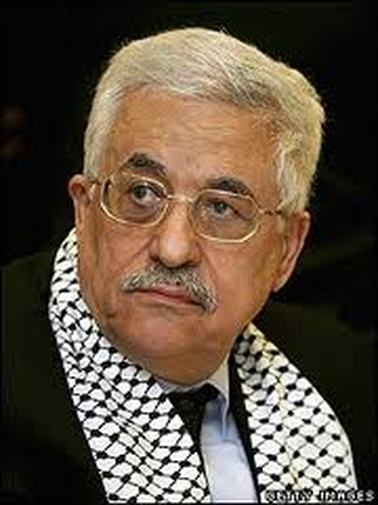
Mahmoud Abbas(Courtesy: bbc.co.uk)
Events in Palestine remind us of a book, Watch Your Words by Marda Dunsky, and popular among journalism professors of advanced copy editing classes.
Observers believe that Mahmoud Abbas didn't watch his words, when he said he would like to visit Sefad, his birth place in Isreal. The consequence was a mob reaction he didn't anticipate. His pictures were set on fire by irate protesters who thought he had given concession over the Palestinian's cause, the New York Times reported.
By the time he reversed his words,it had turned into a politcal baggage.
Abbas isn't the first person to open his mouth and cause himself a near damage before his people.
There have been similar examples during the just concluded presidential campaigns in the U.S. The 47% Americans in Mitt Romney's secret video at a fund raiser in Florida is a good example of politicians' talkfest capable of damage. There was also the Barack Obama's "You didn't build that," and the last before the close of the campaigns, 'Vote for revenge.' In the same way that some news reporters have been quick to remember Romney as saying that FEMA should become history.
"Politicians are always quick to accuse jourrnalists of misquoting them," a journalism professor told his class. "But when the words are said in the public where a journalist cannot be made a scapegoat, the politician carries his or her can of worms." It is for this reason that journalists in training are taught, especially in graduate schools, to watch their words, the written words, and make no mistake about quotes, punctuations, spellings and grammar, to avoid abrupt end to a professional life.
It is glaring that watching how words are used is applicable, not only to journalists and journalism, but it as well serves a dose of lesson to politicians and politics.
Observers believe that Mahmoud Abbas didn't watch his words, when he said he would like to visit Sefad, his birth place in Isreal. The consequence was a mob reaction he didn't anticipate. His pictures were set on fire by irate protesters who thought he had given concession over the Palestinian's cause, the New York Times reported.
By the time he reversed his words,it had turned into a politcal baggage.
Abbas isn't the first person to open his mouth and cause himself a near damage before his people.
There have been similar examples during the just concluded presidential campaigns in the U.S. The 47% Americans in Mitt Romney's secret video at a fund raiser in Florida is a good example of politicians' talkfest capable of damage. There was also the Barack Obama's "You didn't build that," and the last before the close of the campaigns, 'Vote for revenge.' In the same way that some news reporters have been quick to remember Romney as saying that FEMA should become history.
"Politicians are always quick to accuse jourrnalists of misquoting them," a journalism professor told his class. "But when the words are said in the public where a journalist cannot be made a scapegoat, the politician carries his or her can of worms." It is for this reason that journalists in training are taught, especially in graduate schools, to watch their words, the written words, and make no mistake about quotes, punctuations, spellings and grammar, to avoid abrupt end to a professional life.
It is glaring that watching how words are used is applicable, not only to journalists and journalism, but it as well serves a dose of lesson to politicians and politics.
The Press, Bias and the People
By Abiodun Giwa
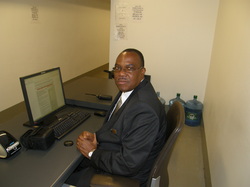
By Abiodun Giwa
The press will need to return to objectivity in political reporting to regain the goodwill of the past, for journalism and journalists to be esteemed again, investigations have revealed. Although the lack of objectivity is said to be common in political reporting, some members of the public see the development as having impacted public's entire view and image of journalism. They say a profession hitherto respected for telling the truth has embraced a mode of following political and ideological beliefs of their proprietors in rejection of objectivity.
"Some of the papers and television houses present news slanted to favor of either the Democratic or the Republican Party. Each of them continues the protection and defense of the interests of the government if it is the party they favor that is in the White House, and whichever party that controls the Congress will have papers and television houses that favor it at its beck and call," Patrick Richardson said.
Democratic Party is seen as highly supported by news organizations that are ideologically liberal, while the Republican Party is viewed as having the support of news organizations that are ideologically conservative. The schism in the media is no longer hidden, some observers affirm, citing television networks and newspapers that openly accuse one another of bias. They give as example, two major television networksand newspapers that openly accuse one another of bias. that each has a permanent column, which call public's attention to news presentations tagged as bias, when such news don't favor their political or ideological patrons.
Evans, a student in a regency school in Manhattan said that for the ways political news are slanted, he doesn't read political news again. He says he will rather open the pages to the sports pages. The same he does with television viewing, seek other programs where the there are no political views or opinions that are presented as news. He said he had resorted to online search for objective information. According to him, some online news are presented by journalists who are't controlled by any proprietor. Most journalists, he said, work in large media organizations with fat pay and benefits and are ready to dance to the dictum 'he who pays the piper dictates the tune'.
Baldwin Scotland, a former police commissioner in Guyana living in New York agrees that the press no longer cares about objectivity. He said each news organization promotes its own political or ideological beliefs and adherents. He said they have become referees that choose the winner and loser in debates all in effort to push their own candidate as the winner. Baldwin's view allied with a question by a participant who expressed frustration with what she described as bias in the press, during a post debate seminar at Adams Play-House in Hofstra University.
However, Professor Susan Drucker, moderator, responded that objectivity is still there in the press with many newspapers, magazines, radios, televisions and the internet. Meaning that the public has many sources to seek and vet information to obtain the truth. In essence, Professor Drucker's assertion agrees with those who say democracy cannot be operated on one way traffic of information, and that the current multi-faceted sources of information enhances dialogue, debate and democracy.
But the public doesn't see it that way. They want reporters insulate politicians and proprietors who have inserted themselves into journalism.
"Some of the papers and television houses present news slanted to favor of either the Democratic or the Republican Party. Each of them continues the protection and defense of the interests of the government if it is the party they favor that is in the White House, and whichever party that controls the Congress will have papers and television houses that favor it at its beck and call," Patrick Richardson said.
Democratic Party is seen as highly supported by news organizations that are ideologically liberal, while the Republican Party is viewed as having the support of news organizations that are ideologically conservative. The schism in the media is no longer hidden, some observers affirm, citing television networks and newspapers that openly accuse one another of bias. They give as example, two major television networksand newspapers that openly accuse one another of bias. that each has a permanent column, which call public's attention to news presentations tagged as bias, when such news don't favor their political or ideological patrons.
Evans, a student in a regency school in Manhattan said that for the ways political news are slanted, he doesn't read political news again. He says he will rather open the pages to the sports pages. The same he does with television viewing, seek other programs where the there are no political views or opinions that are presented as news. He said he had resorted to online search for objective information. According to him, some online news are presented by journalists who are't controlled by any proprietor. Most journalists, he said, work in large media organizations with fat pay and benefits and are ready to dance to the dictum 'he who pays the piper dictates the tune'.
Baldwin Scotland, a former police commissioner in Guyana living in New York agrees that the press no longer cares about objectivity. He said each news organization promotes its own political or ideological beliefs and adherents. He said they have become referees that choose the winner and loser in debates all in effort to push their own candidate as the winner. Baldwin's view allied with a question by a participant who expressed frustration with what she described as bias in the press, during a post debate seminar at Adams Play-House in Hofstra University.
However, Professor Susan Drucker, moderator, responded that objectivity is still there in the press with many newspapers, magazines, radios, televisions and the internet. Meaning that the public has many sources to seek and vet information to obtain the truth. In essence, Professor Drucker's assertion agrees with those who say democracy cannot be operated on one way traffic of information, and that the current multi-faceted sources of information enhances dialogue, debate and democracy.
But the public doesn't see it that way. They want reporters insulate politicians and proprietors who have inserted themselves into journalism.
There Was a Country
By Abiodun Giwa
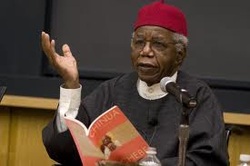
Chinua Achebe(Courtesy: Achebe.com)
A new book ,There Was A Country, by Chinua Achebe is causing furore in Nigeria among politicians and the public, over a statement that one of the nation's foremost nationalist, Chief Obafemi Awolowo, caused the starvation and the death of thousands of people on the Biafra's side, during the Nigeria-Biafra civil war of 1967 and 1970.
Reports said that politicians allied to Chief Awolowo find it distasteful that the author could ascribe his kinsmen's starvation and death during the war to the late nationalist leader.
Opposition to the late politician's allies are also thick because the issue that Achebe raises in his book isn't a secret; having been debated in the past when the said leader was alive and never denied the statement repeated by the author in his book. Some observers also don't understand the basis of the late politician's allies denials, just as many people cannot locate the rationale behind the author's decision to unearth an issue capable of truncating Nigeria's fragile unity. And others are wondering why the title of the book is in the past tense.
Achebe is the celebrated author of a popular novel, Things Fall Apart, and a professor at Brown University, Rhode Island, United States.
Reports said that politicians allied to Chief Awolowo find it distasteful that the author could ascribe his kinsmen's starvation and death during the war to the late nationalist leader.
Opposition to the late politician's allies are also thick because the issue that Achebe raises in his book isn't a secret; having been debated in the past when the said leader was alive and never denied the statement repeated by the author in his book. Some observers also don't understand the basis of the late politician's allies denials, just as many people cannot locate the rationale behind the author's decision to unearth an issue capable of truncating Nigeria's fragile unity. And others are wondering why the title of the book is in the past tense.
Achebe is the celebrated author of a popular novel, Things Fall Apart, and a professor at Brown University, Rhode Island, United States.
